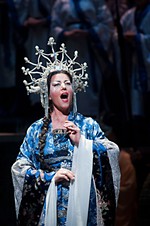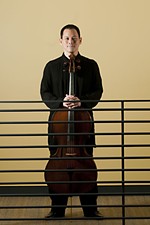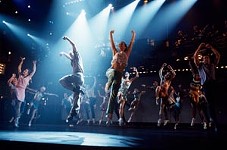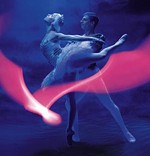Il Trovatore
Austin Lyric Opera's 'Il Trovatore' featured voices in good form, from the leads to the chorus, but the relationships among the characters was clearly missing
Reviewed by Ann Ciccolella, Fri., Oct. 14, 2005
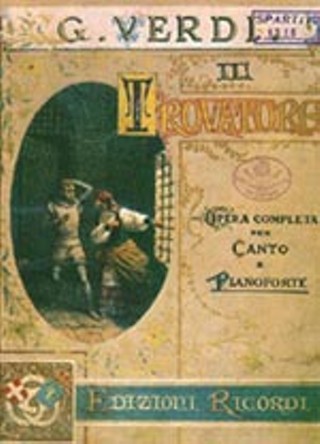
Il Trovatore
Bass Concert Hall, Oct. 7
Sometimes in art as in creative business endeavors, obstacles that make a project seem impossible can make it better. Unfortunately, sometimes that doesn't happen. Opening night of the Austin Lyric Opera season this year meant overcoming Hurricane Katrina's devastation of the scenery that ALO had arranged to rent from the New Orleans Opera. The curtain opened on two large flights of black steps flanking a central upstage platform. Although voices were in good form, from guest artist leads to the well-rehearsed chorus, something was clearly missing (and it wasn't the scenery). It was the relationships among Il Trovatore's characters.
Granted, Trov is a tricky opera to stage. Yes, the plot is riddled with opera clichés and Swiss-cheesy with holes, but it can still be entirely gripping. And the music is still clearly Verdi: brilliant, its strong melodies easy to enjoy even at a first hearing. From the orchestra pit, Richard Buckley, now in his second season as artistic director, poured his passion for the work into the conducting, but something was awry. Fine singers stepped down and center to deliver arias; others stood behind them as if "on deck," waiting for their turn to stand and deliver. Three excellent singers – Donnie Ray Albert, Indra Thomas, and Philip Webb – were cast as the leads in the Friday and Sunday performances, and each had the sound and fury of the character he or she portrayed: Count di Luna's pain of unrequited love, Leonore's longing for her true love, and Manrico's heroic rebel tenor. But we didn't see connections among them. Looking into the eyes of one's beloved was rare; singing one's jealousy to the person one longed for – when it happened – lacked dimension. Emoting to the back of a head is difficult.
The audience was clearly happy to see Albert back on the Austin stage, this time to share his fury as the evil Count in his potent baritone. Isolated characters like his and Mary Phillips' Azucena were more effective because they sang their pain alone, directly to the audience and connecting with us. Azucena popped her eyes (since there was no scenery to chew) and sang in powerful contralto of her gypsy mother burned at the stake, demanding the vengeance that fuels the entire story. Love was there, too, in Verdi's melodies of mother and son and lovers; indeed, Trov is not just a melodramatic plot, since every major character has intense motivation. However, in this production the emotions turned out to be emblematic rather than experienced.
In recent decades, opera acting has been improving, and these singers can act. The lack of scenery last week could have raised the level of innovation in the work of stage director Josemaria Condemi and deepened onstage relationships. As with Tony Tucci's lighting in the recent Ballet Austin production, we might have had magnificent slices of illumination from above the dark vastness of Bass.
So, the show went on … and clearly Maestro Buckley felt the pulse of Verdi, and the chorus was outstanding in the famous Anvil Chorus, but onstage we never saw the visualization of Verdi's power.





